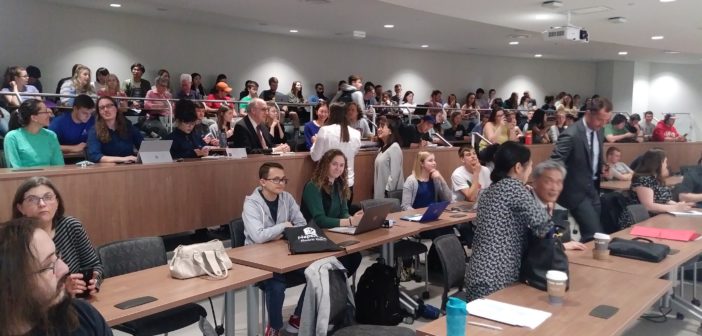“The Paris Agreement is the end of a long process and is the beginning of a new process,” Mr. Chole, French climate representative, said. The forum, held Tuesday, May 22 in Wentz Science Center, focused on the Agreement and the need for all countries to unite and work together to reduce carbon emissions and protect the earth from increased global warming. The Paris Climate Accord, also called the Paris Agreement, focuses on climate change and mitigating greenhouse gas emissions. In 2015, 195 countries came together and signed the accord.
Presentations were given by Fulbright Scholar-in-Residence Dr. Hikaru Kobayashi, Mr. Chole and Ms. Rieko Suzuki representing Japan. North Central College professors that participated in the forum included associate professor of physics Dr. Bloom and Dr. Erin Bergren, visiting assistant professor of environmental studies.
“We are here today to talk about something we have in common, and that is our planet,” Chole said.
The Kyoto Protocol, developed prior to the Accord, is an international treaty among industrialized nations that was established in Kyoto, Japan, with the help of Kobayashi in 1997 to put restrictions on greenhouse gas emissions. It was the first international agreement to control emissions of greenhouse gases, however, it was only ratified by the European Union, Australia, Russia, Japan and some developing countries. The time period of the Protocol ranges from 2008 to 2020, and then the Paris Agreement will go into effect post-2020. Later this year, Japan has planned to launch their second satellite, GOSAT-2, to observe the Earth’s atmosphere and keep track on the greenhouse gases.
In May 2015, the Green Climate Fund (GCF) allocated its resources for projects and programs in developing countries to assist them in adaptation and mitigation practices to counter climate change. Japan confirmed its contribution of $1.5 billion to the fund and is a current top donor for the fund.
“Every country benefits from dealing with this problem,” Bloom said. No matter what, though, countries will have to pay extensively to help the environment. “The effects of climate change are going to be extraordinarily expensive, estimates range any from 1.5 to 5 percent of our gross domestic product (in the United States),” Bergren said. Although investing in climate change mitigation and the GCF is expensive, Bergren believes it will lead to a positive outcome.
“Investing in better regulations to reduce greenhouse gases to reduce the impacts of climate change is a smart investment. We get a return on investment,” he said. “It’s not costing us money, it’s investing in our future and it’s investing in your future, so this is smart money. Not taking action on climate change is going to cost us big in the long run.”
Last year, President Trump decided to withdraw the United States from the Agreement due to the economic disadvantages it would have on the U.S. However, there is a process to withdrawing from the Agreement, which means President Trump won’t be able to officially withdraw the U.S. until the end of 2020. Currently, the U.S. is the only country that does not want to be a part of the Agreement, and from Bergren’s perspective, “that’s a little alarming.”
All the speakers at the forum, especially Dr. Bergren, had a strong belief in the U.S. staying in the Agreement for many reasons. Simply put, Bergren summed it up by stating, “I think withdrawing from the Paris Agreement is really stupid.” Bergren continued to say that “it’s smart to invest in where the economy is going, not in where the economy has been. From an economic perspective, (if we are no longer part of the Agreement) it means that we’re missing out on the investment in renewable energy and clean technology.”

